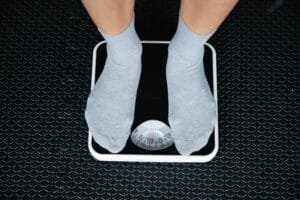Last Updated on December 6, 2025 by shawnshealth
Can lack of sleep make you gain weight? Discover how poor sleep disrupts hormones, boosts cravings, leads to weight gain—and what you can do about it.
Can Lack of Sleep Make You Gain Weight? Really?
Yes, really! Sleep deprivation disrupts hormones like leptin and ghrelin, increasing hunger and cravings.
Have you ever wondered if your inability to sleep could be the reason why your weight seems to creep up, even when you’re eating well and exercising? You’re not alone. Many people struggle with weight gain despite trying everything they can. But the truth is, sleep plays a much bigger role in weight management than we realize. Let’s dive into six shocking truths about how lack of sleep might be affecting your waistline—and what you can do to fix it.
💡 Struggling with sleep and weight gain? You’re not imagining the connection. This guide builds on Why Is Weight Loss So Hard?—a deeper look at how sleep, stress, and hormones quietly sabotage progress. If you want the full picture, start there.
😴 Can Lack of Sleep Really Cause Weight Gain?
- Poor sleep disrupts hormones that control hunger and fullness.
- Increased ghrelin (hunger hormone) and decreased leptin (satiety hormone) lead to overeating.
- Sleep deprivation slows metabolism, making it easier to store fat.
🍔 How Does Sleep Affect My Appetite?
- Sleep loss increases cravings for high-calorie, sugary foods.
- It impairs decision-making, leading to unhealthy food choices.
- Restoring sleep balance helps regulate appetite naturally.
🏋️♂️ Does Poor Sleep Impact My Energy for Exercise?
- Yes—lack of rest lowers motivation and physical performance.
- Fatigue from sleep deprivation reduces workout intensity and duration.
- Better sleep improves recovery and boosts workout effectiveness.
😰 Is There a Link Between Sleep and Stress-Related Weight Gain?
- Sleep deprivation raises cortisol, the stress hormone linked to belly fat.
- High cortisol encourages fat storage and disrupts insulin sensitivity.
- Managing sleep can help break the stress-weight gain cycle.
➡️ Want the complete breakdown? Read our Ultimate Weight Loss & Fat Loss Guide.

Table of Contents
Medical Disclaimer: This content is for informational purposes only. Consult a healthcare professional before making any health or fitness changes.
Amazon Affiliate Disclaimer: As an Amazon Associate, I earn from qualifying purchases.
🎥Check out this video from Dr. Mike Israetel at Renaissance Periodization on the importance of sleep for fitness!
My Experience
I’ll be honest—I was in denial for years. I thought sleep had nothing to do with weight loss. I was working out, eating clean, doing everything “right”… so why would a few missed hours matter?
Turns out, they matter a lot.
My wife finally called me out: “You help everyone else get in shape, but you’re sabotaging your own progress by skipping sleep.” She wasn’t wrong (don’t tell her I said that).
I pouted, shuffled off like a grumpy toddler, and started making changes. More sleep, less zombie-lurching through the neighborhood. And guess what? My heart rate dropped, my weight stabilized, and I stopped terrifying the neighbors with my 5AM moaning strolls.
Sleep isn’t just recovery—it’s a metabolic reset button. And if you’ve been stuck despite doing everything else right, this might be the piece you’ve been missing.
💤 Sleep Might Be the Missing Piece. Poor sleep quietly sabotages your weight loss efforts—by disrupting hormones, triggering cravings, and slowing metabolism. This post reveals 6 shocking truths and how to fix them—without gimmicks, starvation, or 4AM cardio.
The 6 Truths
1. Lack of Sleep Disrupts Your Hunger Hormones
One of the first things sleep deprivation affects is the delicate balance of hormones that control hunger—ghrelin and leptin. Ghrelin is known as the “hunger hormone,” as it triggers your appetite, while leptin helps you feel full and satisfied after meals.
When you don’t get enough sleep, ghrelin levels rise, causing you to feel hungrier than usual. At the same time, leptin levels drop, which means you don’t feel as satisfied after eating. This hormonal imbalance is one of the main reasons why people tend to overeat after a night of poor sleep.
Solution:
To counteract this, focus on improving your sleep hygiene. Start by creating a bedtime routine that allows for at least 7–9 hours of restful sleep each night. You might also want to try calming teas, such as chamomile or lavender, or relaxation techniques, such as deep breathing exercises or meditation, before bed. These can promote better sleep and help regulate your appetite.
Additionally, try to avoid caffeine and alcohol late in the day, as these can interfere with sleep quality.
💤 Want Better Sleep Tonight? Don’t miss Sleep Foundation’s Ultimate Tips for Better Sleep. From optimizing your bedroom to building a wind-down routine, these science-backed strategies can help you fall asleep faster and stay asleep longer.
2. Poor Sleep Slows Down Your Metabolism
When you sleep poorly, your body enters a state of stress, causing a spike in cortisol—a stress hormone that can slow down your metabolism. This means that not only are you burning fewer calories, but your body is also more likely to store fat rather than burn it for energy. The hormonal fluctuations that occur when you’re sleep-deprived can also lead to insulin resistance, further complicating the body’s ability to regulate blood sugar.
Solution:
Get moving during the day! Even if you can’t exercise intensely, taking regular walks or doing gentle stretches can help keep your metabolism working efficiently. Additionally, try to eat smaller, more frequent meals throughout the day to keep your metabolism active.
Avoid heavy meals right before bed, as this can make your sleep even worse and exacerbate metabolic slowdowns. Instead, focus on having a light, balanced dinner that includes lean protein and healthy fats, which promote stable energy levels.
🔥 Struggling with low energy or stubborn weight? Poor sleep can slow your metabolism more than you think. If you’re feeling stuck, read my article: How to Boost a Slow Metabolism—it breaks down practical, science-backed ways to fire things up again, even if you’re starting from zero.
3. Sleep Deprivation Can Lead to Emotional Eating
Lack of sleep not only messes with your appetite but can also lead to emotional eating. When you’re tired, your brain is less able to make rational decisions, which can cause you to crave comfort foods, especially when you’re stressed or anxious. Research shows that sleep deprivation can make you more sensitive to food-related cues, triggering cravings for high-sugar or high-fat foods, which are often seen as “comfort foods.”
Solution:
Instead of reaching for snacks, try practicing mindfulness and stress-relieving activities like yoga, journaling, or listening to calming music. These can help lower your stress levels and improve your mood without resorting to food for comfort.
Mindful eating practices, such as focusing on the taste and texture of your food and eating slowly, can also help you make healthier choices. Consider keeping healthy snacks on hand, like nuts, fruits, or whole-grain crackers, to prevent emotional eating.
🛏️ The Weighted Blanket I Use for Better Sleep: This one’s breathable, calming, and actually helps me fall asleep faster. Grab it on Amazon if you want that “hugged” feeling without overheating.

4. Poor Sleep Causes Insulin Resistance
When you’re sleep-deprived, your body’s cells become less responsive to insulin, the hormone responsible for managing your blood sugar. This can lead to higher blood sugar levels and insulin resistance, a condition that often results in weight gain, especially around the abdomen. Insulin resistance is also linked to other health problems, including diabetes and heart disease, making it crucial to address sleep-related issues as part of a healthy lifestyle.
Solution:
You can improve your insulin sensitivity by getting adequate rest, managing stress, and eating a balanced diet rich in fiber, healthy fats, and lean protein. Incorporating low-glycemic foods such as vegetables, legumes, and whole grains can help avoid blood sugar spikes, making it easier for your body to process food efficiently.
In addition to diet changes, aim to reduce your cortisol levels through relaxation techniques, as this can help improve your insulin function and support better sleep.
5. Sleep Loss Affects Your Decision-Making Abilities
When you’re sleep-deprived, your ability to make rational decisions is significantly impaired. This includes decisions about food. Research has shown that people who don’t get enough sleep tend to choose higher-calorie, less nutritious foods over healthier options. This is particularly problematic because the poor food choices often contribute to weight gain and unhealthy eating patterns.
Solution:
Set a routine that helps you stick to healthy food choices even when you’re tired. Meal prepping for the week or keeping healthy snacks at arm’s reach can help curb unhealthy cravings. You can also try implementing a “No Junk After Dark” rule, which can prevent you from indulging in unhealthy foods when your decision-making ability is compromised.
Creating a sleep-friendly environment—such as keeping your bedroom cool, dark, and quiet—can also improve your decision-making abilities, making it easier to resist cravings and stick to healthy habits.

6. Sleep Deprivation Increases Inflammation and Stress
Chronic lack of sleep contributes to increased inflammation in the body, which is linked to a host of health problems, including weight gain. Additionally, sleep deprivation raises cortisol levels, which are known to promote fat storage, particularly in the abdominal area. This combination of inflammation and cortisol can lead to both physical and mental health struggles, making it harder to manage weight in the long run.
Solution:
Combat inflammation by ensuring you’re getting enough quality sleep, eating an anti-inflammatory diet, and engaging in regular physical activity. Foods rich in omega-3 fatty acids (like salmon, flaxseeds, and walnuts) and antioxidants (like berries, spinach, and turmeric) can also help reduce inflammation in the body.
Reducing stress through regular physical activity, yoga, and relaxation exercises like deep breathing or meditation can help reduce cortisol levels, improving both your sleep and overall health.
🔥 Want to Lower Inflammation Naturally? WebMD’s Guide to Reducing Inflammation breaks down the foods, habits, and lifestyle changes that help calm chronic inflammation—especially the kind linked to weight gain, stress, and poor sleep.

Conclusion:
The evidence is clear: lack of sleep can make you gain weight. From disrupting hunger hormones to increasing inflammation, your sleep habits have a direct impact on your waistline. But the good news is that by improving your sleep quality and incorporating simple lifestyle changes, you can take control of your health and start seeing results.
Remember, better sleep leads to better decisions, less stress, and a healthier metabolism. So, start prioritizing your sleep tonight—and watch how it transforms your weight and overall well-being. Don’t wait—make sleep a priority today!
✅ Quick Recap: 6 Ways Poor Sleep Sabotages Your Weight
- Hormonal Chaos – Ghrelin spikes, leptin drops = constant hunger and zero satisfaction.
- Metabolism Slowdown – Cortisol rises, fat storage increases, calorie burn tanks.
- Emotional Eating – Tired brains crave comfort food and make impulsive choices.
- Insulin Resistance – Blood sugar control breaks down, leading to belly fat and fatigue.
- Bad Decisions – Late-night junk food wins when sleep-deprived logic fails.
- Inflammation & Stress – Chronic sleep loss triggers inflammation and cortisol overload.
❌ What NOT to Do If You’re Sleep-Deprived
- Don’t rely on caffeine to power through—it disrupts sleep even more and masks the real issue.
- Don’t skip workouts entirely—gentle movement helps regulate hormones and improve sleep.
- Don’t eat heavy meals late at night—your body needs rest, not digestion drama.
- Don’t ignore your sleep environment—light, noise, and temperature matter more than you think.
- Don’t assume sleep is optional—it’s foundational, not a luxury.
🔥 Gear to Help You Achieve Your Health and Fitness Goals 💪
If you’re looking for tools to enhance your fitness journey, check out this. Explore top-rated fitness gear on Amazon to enhance your workouts. Check out the latest picks here! 🛒 to support your workouts and progress.
🚀 Find equipment designed to boost strength, endurance, and overall performance!
⚠️ Short disclaimer: As an Amazon Associate, I earn from qualifying purchases.
🔗 More Support for Your Health Journey
If sleep feels like the missing piece, these guides expand on the deeper causes of weight gain—and how to fight back with real-world strategies:
- Why Is Weight Loss So Hard? An Honest Guide to Making It Easier Unpacks the emotional, hormonal, and behavioral traps that sabotage progress—plus how to escape them.
- How to Boost a Slow Metabolism Practical, science-backed ways to fire up your metabolism—even if you’re starting from zero.
- How to Get Lean and Stay Lean A no-nonsense guide to building a leaner body and keeping it—without gimmicks, starvation, or burnout.
- Senior Fitness Principles That Actually Work Movement strategies for aging strong, staying mobile, and building strength without burnout.
- Beginner Chair Exercises for Seniors Gentle routines that support mobility, confidence, and consistency—especially if you’re just getting started.
💤 FAQ: Can Lack of Sleep Make You Gain Weight?
❓ How does lack of sleep lead to weight gain?
Sleep loss increases hunger hormones, reduces satiety signals, and raises cravings for sugary and high-fat foods, often leading to overeating.
❓ Can sleeping more help with weight loss?
Yes. Quality sleep supports hormone balance, improves metabolism, and helps control appetite—making weight loss easier to maintain.
❓ Is it possible to gain weight just from poor sleep?
Yes. Even without changes in diet or exercise, chronic sleep deprivation can disrupt metabolic processes and promote fat storage.
❓ How many hours of sleep do I need to avoid weight gain?
Most adults need 7–9 hours of quality sleep per night to maintain a healthy weight and support overall wellness.
❓ Can lack of sleep cause belly fat?
Yes. Elevated cortisol levels from poor sleep can promote fat accumulation around the midsection, especially belly fat.
🔄 Ready to Reset Your Sleep and Your Weight? Start with one small change tonight. Then explore my guides on metabolism, emotional eating, and sustainable fat loss. Your next step is already waiting.
Have I not commanded you? Be strong and of good courage; do not be afraid, not be dismayed, for the Lord your God is with you wherever you go. – Joshua 1:9




